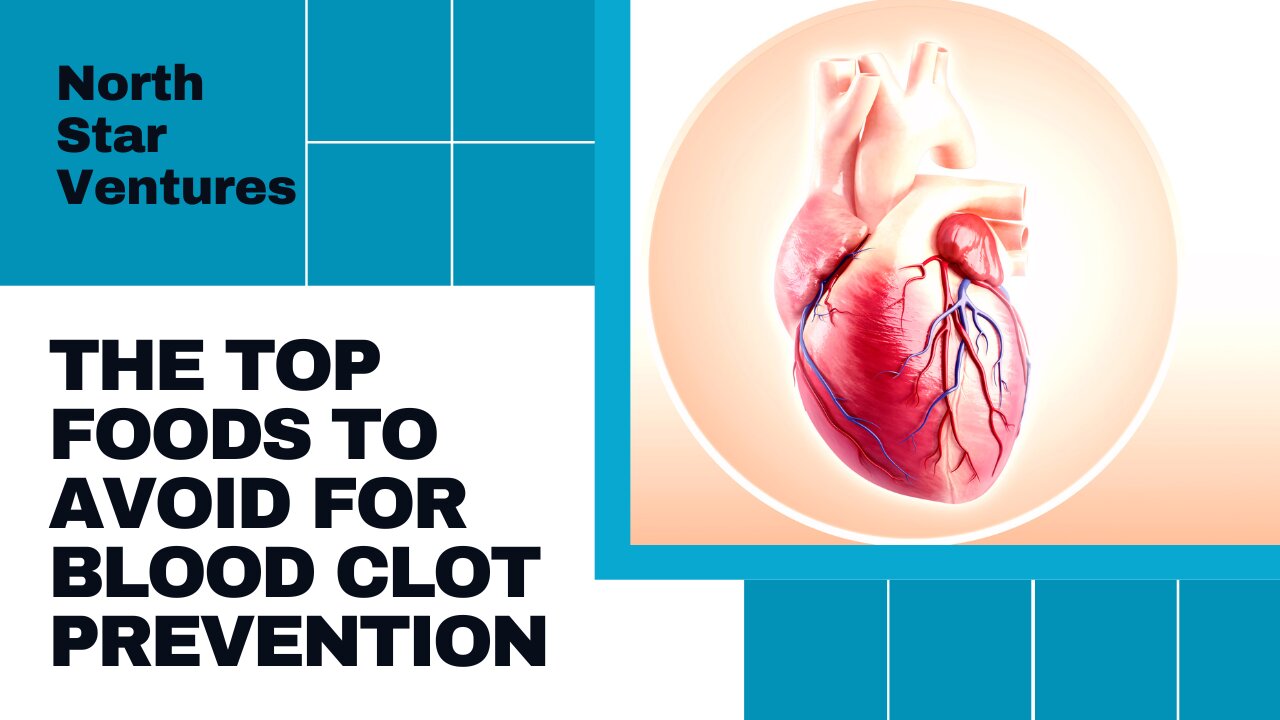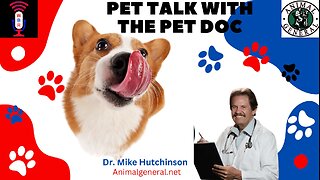Premium Only Content

The Top Foods to Avoid for Blood Clot Prevention - North Star Ventures Guide
Welcome back to North Star Ventures, where we empower you with the knowledge to make healthier lifestyle choices. Today, we're unveiling the foods that could be silently increasing your risk of blood clots. In the U.S. alone, blood clots claim the lives of up to 300,000 individuals annually. While clotting is essential for wound healing, its occurrence within blood vessels can precipitate life-threatening conditions such as deep vein thrombosis, pulmonary embolisms, and strokes. Your diet plays a pivotal role in warding off these risks. Join us as we explore the seven foods that might be putting you in harm's way and how you can steer your diet towards safer shores. Remember, this video is for educational purposes, and we recommend consulting a healthcare provider for personal medical advice. Let’s dive in.
First on our list are artificial sweeteners, which many believe to be a healthier alternative to sugar. However, a groundbreaking study in 2023 cast a shadow on these substitutes, particularly one named 'Ariol'. Analysis of health records from 3,000 individuals revealed that Ariol consumers had a nearly doubled risk of experiencing heart-related issues within three years. Laboratory tests further disclosed that Ariol could make blood platelets more prone to clotting. Other studies, including those from reputable institutions like Harvard University, have linked sweeteners such as aspartame and acesulfame potassium to increased risks of stroke and heart disease, potentially due to their inflammatory effects and disruption of gut microbiota. Next time you're considering an artificially sweetened treat, it might be worth pausing to consider the implications.
Our journey into dietary dangers brings us to processed meats. These convenient staples of the Western diet, including bacon, sausages, and deli meats, are not only high in unhealthy fats but also contain preservatives such as nitrates and nitrites that transform into harmful nitrosamines in your body. The high cooking temperatures used for these meats further produce advanced glycation end products, exacerbating the risk of clot formation. Frequent consumption of processed meats has also been linked by University of Oxford studies to increased risks of heart disease and colorectal cancer. Reducing your intake of these processed options can significantly benefit your cardiovascular health.
Refined carbohydrates are next, hiding in plain sight within bread, pasta, pastries, and cookies. These stripped-down grains spike our blood sugar and trigger inflammation, a precursor to numerous health issues, including increased clotting risk. Opting for whole-grain alternatives can greatly enhance your health and well-being.
Fast food, while convenient, is a trove of low-quality meats, reused oils, and an overload of carbs and unhealthy fats. These components contribute to inflammation and elevate your risk of chronic diseases, making it prudent to opt for healthier meals.
Canned soups and prepared meals might save time, but their high salt content and preservatives can adversely affect blood pressure and clotting. Moderation and mindful selection are key to navigating these convenient options.
Interestingly, moderate red wine consumption has been touted for its potential to prevent blood clots. However, excessive intake can disrupt liver function and gut microbiota balance, tipping the scales towards health complications rather than benefits.
And finally, the omnipresent sugar in our diets contributes to glycation, a process detrimental to protein function and a promoter of clot formation. Surprisingly, artificially sweetened beverages are not a safer bet, carrying similar risks alongside those posed by their sweetening agents.
On a brighter note, nature offers bountiful foods that support heart health, such as kiwi fruit, herbs and spices like garlic and cayenne pepper, cloves, and extra virgin olive oil. Incorporating these into your diet can combat clot formation and promote overall well-being.
We hope this guide illuminates the path towards a healthier heart and a more vibrant life. Share your thoughts and questions in the comments below – we’re here to engage and assist. Don’t forget to share this video to spread vital health awareness and subscribe to North Star Ventures for more enlightening content on health, nutrition, and wellness. Click the subscribe button and notification bell to stay updated. Thank you for watching, and we'll see you in the next video!
-
 1:03:07
1:03:07
Candace Show Podcast
1 day agoI’M BACK! And STILL Asking Questions (Sorry Brigitte). | Candace Ep 233
120K213 -
 13:13
13:13
Mrgunsngear
19 hours ago $6.46 earnedStreamlight TLR-1 HP Review: Can It Dethrone Surefire?
44.4K10 -
 1:26:34
1:26:34
Man in America
21 hours agoExposing the Cover-Up That Could Collapse Big Medicine: Parasites
98.9K83 -
 1:12:09
1:12:09
Wendy Bell Radio
8 hours agoPet Talk With The Pet Doc
28.3K48 -
 27:15
27:15
Liberty Hangout
2 days agoThe Most DELUSIONAL Democrats on Earth!
51.7K158 -
 38:41
38:41
JohnXSantos
1 day ago $1.16 earnedHow To Start A CLOTHING BRAND on a BUDGET! Step X Step (2025)
25.3K2 -
 30:57
30:57
Her Patriot Voice
19 hours ago $17.26 earnedDemocrats More Unhinged Than EVER Before!
110K151 -
 29:13
29:13
Clownfish TV
1 day agoGen Z are Becoming the Boomers?! | Clownfish TV
31K41 -
 1:48:31
1:48:31
Squaring The Circle, A Randall Carlson Podcast
21 hours agoMEGA Tsunamis and the formation of our World ft. Dr. Dallas Abbot
43.6K9 -
 29:26
29:26
Advanced Level Diagnostics
2 days ago $0.31 earned2019 Chevy Express - No Crank, Relay Clicking! Diag & Fix!
11.2K1